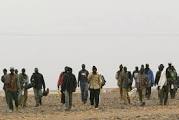 Human Rights Watch has denounced the new repressive campaign launched by Algerian authorities targeting sub-Saharan Africans, including women and children, expelling many of them to Niger.
Human Rights Watch has denounced the new repressive campaign launched by Algerian authorities targeting sub-Saharan Africans, including women and children, expelling many of them to Niger.
The Algerian authorities have deprived those arrested of their right to challenge their detention and possible deportation, said HRW.
As in earlier waves in October 2017 and December 2016, security forces rounded people up on the streets or at construction sites, where many work. Most, if not all, were taken to a facility in Zeralda, a suburb of the capital, where they spent one to three days in crowded halls with no mattresses and little to eat, people who were arrested told Human Rights Watch.
Security forces then bused the migrants 1,900 kilometers south to a camp in Tamanrasset. In the previous waves, they took some of the migrants by trucks to Guezzam, a town near the border, then over the border into Niger.
“Algeria is rounding up and deporting migrants in a degrading way and depriving them of the right to have their cases reviewed on an individual basis,” said Sarah Leah Whitson, Middle East and North Africa director at Human Rights Watch.
A local activist who asked not to be named said that round-ups of hundreds of migrants occurred on January 24 and on February 10. The overall number of those expelled in 2018 is not known.
The International Rescue Committee (IRC), which operates an assistance program for migrants in Agadez, Niger, estimated the total at 3,000 since the beginning of 2018, with 500 since February 10, mostly from Niger, and small numbers from Nigeria, Cameroon, Mali, and Guinea.
Trusted sources in Algiers told Human Rights Watch that those detained in January and February included 20 refugees and asylum seekers, among them two minors. Authorities released some after ascertaining their status, while others escaped during their transfer to Tamanrasset. The whereabouts of at least two is unknown.
Human Rights Watch which interviewed several persons among those who were held in Tamanrasset, said they described the conditions in the camp in Tamanrasset as “inhumane, dirty, and overcrowded, with detainees going an entire day without food”.
They said that the detainees included Nigeriens, Malians, Cameroonians and Ivorians, and that there were women and children among them.
According to HRW, Algeria should give each African migrant an effective opportunity to challenge their removal and to consider their individual circumstances. It should not subject migrants to arbitrary detention, or any form of inhuman and degrading treatment.
As a party to the 1951 Refugee Convention and the 1987 Convention against Torture and Other Cruel, Inhuman or Degrading Treatment or Punishment, Algeria is barred from forcibly removing any refugee or asylum seeker to a place where they would face a threat of being persecuted, risk being tortured, or subjected to inhuman and degrading treatment, the human rights watchdog stated.